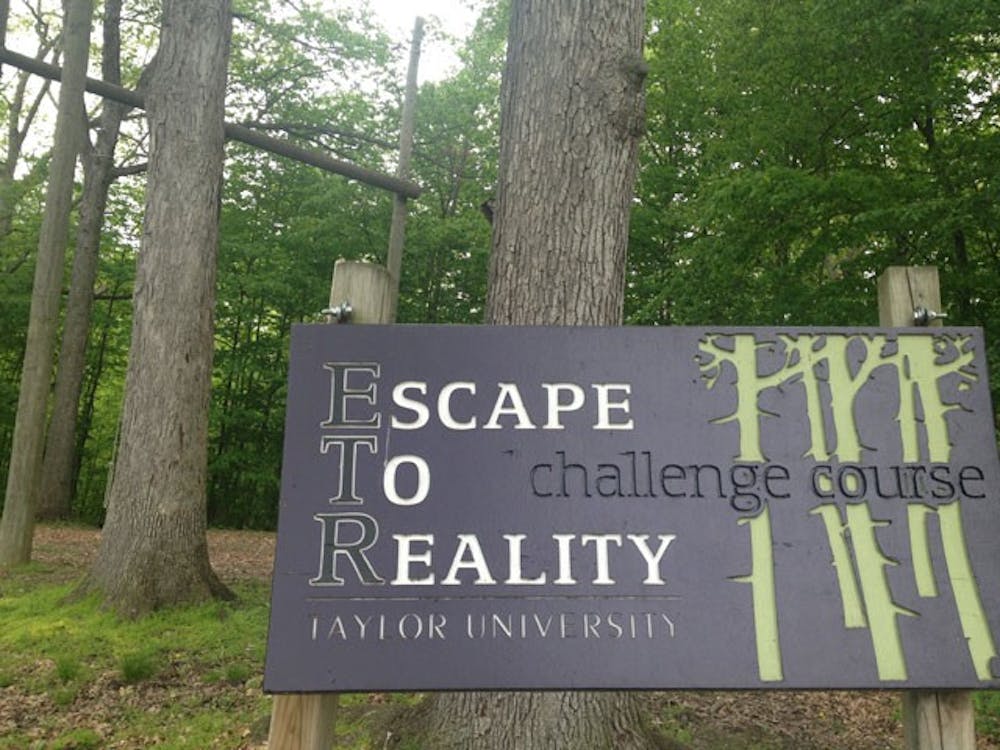By: Erika Norton| Echo
The Escape to Reality (ETR) high ropes course will most likely be decommissioned this summer. According to Dean of Students Skip Trudeau, the ETR course needs significant upgrades and is not sustainable.
"I don't think-and I've looked at these numbers a few times over this past semester-it's never broken even," Trudeau said. "We charge people to use it, and it's never covered the expenses of it, so we've had to subsidize it from Student Development budgets and those kinds of things."
However, according to Michael Berger, former director of the ETR, this year was the first year they broke even. As director for the last two years, one of Berger's commissions was to make the ropes course pay for itself.
According to Berger, his first year ETR staff didn't quite make it but were very close. This past year, the course exceeded the amount needed and generated a small profit, meaning there was sufficient funds to pay for all equipment, staff hours, training, assessments and maintenance, among other needs.
The reason the course is not sustainable is that approximately every 20 years, the poles start rotting and other hard equipment on the course needs fixing or replacing. According to Berger, these pieces of equipment are at the point where they are becoming a safety hazard and need to be replaced.
To do enough patch work to make the course safer would cost $20,000 and to completely replace everything would cost more than $90,000, Berger said. When looking at the mission of Taylor, the ETR complements the mission, but when looking for places to make cuts, this isn't enough to invest that much money.
"If (they'd) given the course another two or three years, we definitely could have made it sustainable, but it would have required a significant investment right now and that just couldn't happen," Berger said.
The ETR has been at Taylor for 22 years. It became a reality in 1992, when Taylor alum Jeff Dye donated and built the course with his organization Experiential Therapists Inc. Dye described the ETR as experiential therapy, which uses a combination of low and high challenges to facilitate therapeutic goals.
The goal of the course was to get people out of offices, hospitals and clinics and allow them to "escape to reality" through counseling and challenging themselves. In fall 2002, Taylor alum Justin Heth ('00) and Dean of Residence Life Steve Morley began teaching the Challenge Course Adventures class and the facilitator training classes, in addition to adding some low ropes elements.
Tony Wormgoor, who has been involved with the course in a number of capacities since 2008, believes the course is very valuable for both prospective and current students.
"I think that the ropes course offers a unique programming possibility for individuals to grow in their self-esteem as well as in group dynamics," Wormgoor said.
If the ETR is decommissioned,the challenge course class will have to be adapted, and the facilitator training course will no longer be offered. During the summer, camps will no longer have the option to use the course, but according to Trudeau, this likely will not affect camp attendance.
Also, the facilitator campus job, which employed about 15 students this past school year and employs students over the summer, will no longer exist. Senior Raegan Flikkema said she worked as an ETR facilitator for at least 10 events this past fall semester and described it as a steady job.
Concerning possible future replacements for the ropes course, Trudeau said that there have been talks of using the land Taylor owns on the west side of campus for leadership centers and adventure course-type facilities, but nothing has been finalized.
Trudeau said Taylor had a company come earlier in the year to evaluate the ETR and create a proposal for what decommissioning the course would look like cost-wise. Once this company has made the proposal, the final decision will be made.
"It's going to be a hard call, I think," Trudeau said. "I've enjoyed the ropes course, I think lots of people have, but in its current state, we know we could probably get by another year, but within a very short time, we're looking at sinking some significant new dollars into keeping it safe."





